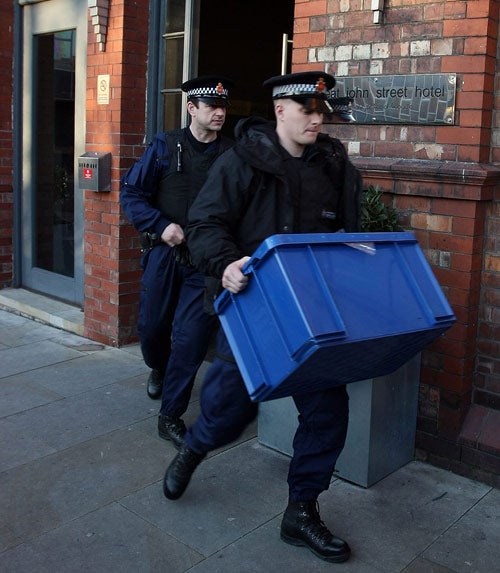James Lawton: This is England: a country where football enjoys excess in all areas

Welcome to English football, Signor Capello. Welcome to the culture which gave us the Wags of Baden Baden during your new team's catastrophic World Cup campaign in Germany last year and, this week, the second rung of football glitterati, the bussed-in groupies of Manchester United.
The rape investigation is incidental to the broader picture of the players of England's most prestigious club throwing 4,000 each into the hat for an all-day, all-night and most-of-the-small-hours stint of boozing, gambling and lap dancing.
This, after all, is the disturbing season of party excess and the boundaries of all propriety, including sexual, are as threatened in business estates and offices in places like Slough as in the glitzy watering holes of Manchester and London's West End favoured by millionaire football players.
However, as the new manger of England suggested this week, a footballer has his rewards, his celebrity and his responsibilities to the image of the game in which he waxes so rich. One of them is to present himself as someone with a significant place in society, an example to youth, a young man of talent who has a brief period of his life to do that for which he is best equipped.
Someone, who by virtue of his good fortune, his travel, his mind-expanding experiences, has grown beyond the horizons of the average lager-swilling dead-end kid in some backwater town.
United's ferociously committed manager, Sir Alex Ferguson, was understandably reluctant to approve the latest example of the English footballer's rather tawdry version of La Dolce Vita.
Why? Because he has spent a little too much of his professional life putting out the fires of anarchic behaviour when footballers entertain themselves en masse, when the idea that they represent a great and popular institution, which pays them what most of the population would consider fantasy wages, can drain away with the first pint or brightly-coloured cocktail.
Ferguson has been here too many times for his own peace of mind. When he arrived at Old Trafford 21 years ago his first challenge was to clear away a drinking culture. Having done that once, he can only be filled with angst when he finds it lapping again into the pages of the tabloids.
Back in those early days at Old Trafford he broke up one party involving his star winger, Lee Sharpe, with as much force as was legally possible. He concluded, sadly, that there was no place for the drinking habits of Paul McGrath, a brilliant defender, and there were times when he had to wrestle with the wayward tendencies of his most significant player, Roy Keane, once visiting him in a police cell after a fracas in a city-centre bar.
Yet none of this compared to the trial of his great predecessor Sir Matt Busby, who was never able to control the results of the drinking addiction of his ultimate star, George Best. What is different now is the scale of the self-indulgence and its exposure. Best did his drinking in a backstreet pub in Salford. His successors hire the ritziest hotel in town.
For Capello the shock of the behaviour splashed across newspapers and broadcasts this week is intensified by his own background in the Italian game. There, as a leading player and then one of the most successful coaches, he was nourished by the fact that however poor a player's background, however thinly educated, he was taught that he had made his mark in life and that along with the glory, for himself and his family, came certain obligations.
It was interesting to stay in the same hotel as an Italian team recently. They were not Milan or Juventus or Roma; they weren't big-shots. They were Udinese, but the players all wore suits, had a glass of wine with dinner, and some took a stroll down the front of the Venice Lido. They looked like serious men rather than overgrown boys with lights in their eyes.
When the Liverpool star Ian Rush, a notably decent professional, became one of the few products of the English game to move to Italy in the 1980s, he had the reverse of the shock Capello must have felt while reading the Manchester story and the one he encountered earlier at the hedonistic circus of Real Madrid. After his first game for Juventus, Rush asked to be directed to the players' bar. "Players' bar?" was the incredulous reaction.
Recalled Rush: "There was no such thing ... one by one the players came out of the dressing room, had a few words with the media, got into their cars and drove off to their villas in the hills."
Whatever they did after that, Rush learnt quickly enough, was with much discretion. It was almost as if they had reputations to protect.
Join our commenting forum
Join thought-provoking conversations, follow other Independent readers and see their replies
Comments